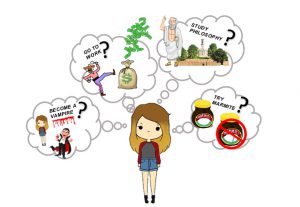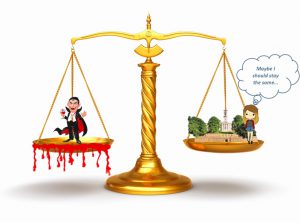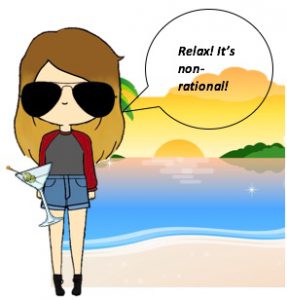December 12, 2017, by eeyel1
You’ve Been Making Non-Rational Decisions!
 After attending Andy Fisher’s lecture today, I had an unsettling realisation: I’ve been making non-rational decisions. My decision to study Philosophy at university? Non-rational. My decision to try Marmite for the first time? Yes, you guessed it, non-rational. That’s because, as L.A. Paul argues, many of the decisions we make can’t be made rationally – here’s why!
After attending Andy Fisher’s lecture today, I had an unsettling realisation: I’ve been making non-rational decisions. My decision to study Philosophy at university? Non-rational. My decision to try Marmite for the first time? Yes, you guessed it, non-rational. That’s because, as L.A. Paul argues, many of the decisions we make can’t be made rationally – here’s why!
RATIONAL DECISIONS
According to Paul, to make a rational decision, we weigh up the relevant outcomes and choose the act with the highest overall expected outcome. Consider deciding whether to go to work or not go to work.
 Firstly, you give values to each outcome. Going to work has the outcome of being paid, which you value very highly, but you’ll have less fun. Not going to work has the outcome of more fun, which you value highly, but you won’t be paid. Table 1 shows that going to work has a higher overall expected value, so this is the rational decision.
Firstly, you give values to each outcome. Going to work has the outcome of being paid, which you value very highly, but you’ll have less fun. Not going to work has the outcome of more fun, which you value highly, but you won’t be paid. Table 1 shows that going to work has a higher overall expected value, so this is the rational decision.

Table 1: Rational Decision-Making
Alternatively, a decision is irrational if an individual doesn’t follow the rational decision-making process. For example, not choosing the act with the highest overall expected value. Therefore, in the case above, it would be an irrational decision to not go to work.
NON-RATIONAL DECISIONS
HOWEVER, if an outcome of a decision is a transformative experience, radically changing who you are or what you know, we cannot make a rational decision. This is because rational decision-making involves giving values to all outcomes, but we cannot predict the value of a transformative experience. But why?
VAMPIRE OR HUMAN?
Imagine you’re given this decision: become a modern-vampire OR not. If you become a modern-vampire, you’d drink the blood of humanely farmed animals, be immortal, super fast and strong. You ask the advice of people who have become modern-vampires and they say ” it’s incredible, do it, but you have to become a vampire to know what it’s like.”
 Significantly, you CAN’T make this decision rationally. Becoming a modern-vampire would be a transmative experience. You don’t know and you can’t know what it’s like to be a modern-vampire. The value of this outcome is inaccessible to you; you might LOVE being a vampire but you might HATE it. As shown by Table 2, the overall expected values would be unknown. Therefore, its a non-rational decision.
Significantly, you CAN’T make this decision rationally. Becoming a modern-vampire would be a transmative experience. You don’t know and you can’t know what it’s like to be a modern-vampire. The value of this outcome is inaccessible to you; you might LOVE being a vampire but you might HATE it. As shown by Table 2, the overall expected values would be unknown. Therefore, its a non-rational decision.

Table 2: A Non-Rational Decision
YOU’VE BEEN MAKING NON-RATIONAL DECISIONS…
You’re unlikely to be deciding whether or not to become a vampire anytime soon, but this shows why we’re unable to make rational decisions if one of the outcomes is a transformative experience. You can’t access what its like to become a vampire, study Philosophy at university or even try Marmite for the first time. So, next time you’re weighing up the pros and cons of a life-changing decision, you may as well kickback and relax – its probably non-rational anyway!
Want more?
Here’s an interview which Laurie Paul herself. She discusses transformative experiences and the vampire dilemma!
Interview source: edge.org
Image/illustrations: Authors own
Word Count: 300 (excluding graphs and sub-titles)
Posted in
Uncategorized
No comments yet, fill out a comment to be the first

Leave a Reply